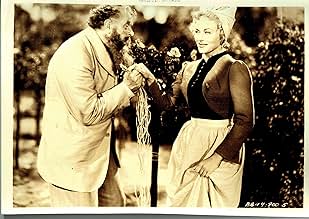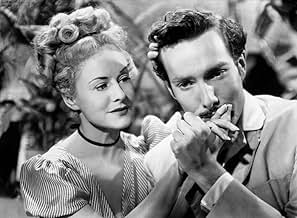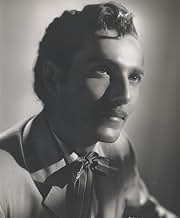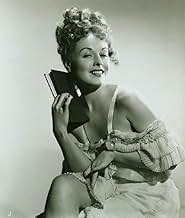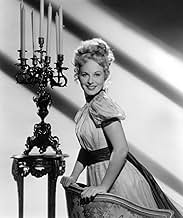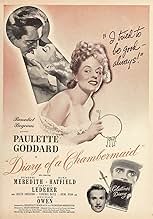Le journal d'une femme de chambre
Titre original : The Diary of a Chambermaid
- 1946
- Tous publics
- 1h 26min
NOTE IMDb
6,5/10
1,6 k
MA NOTE
Ajouter une intrigue dans votre langueA chambermaid plots to climb the social ladder by marrying a wealthy man.A chambermaid plots to climb the social ladder by marrying a wealthy man.A chambermaid plots to climb the social ladder by marrying a wealthy man.
- Réalisation
- Scénario
- Casting principal
- Récompenses
- 1 victoire au total
Edward Astran
- Townsman
- (non crédité)
Arthur Berkeley
- Townsman
- (non crédité)
Chet Brandenburg
- Townsman
- (non crédité)
Egon Brecher
- The Postman
- (non crédité)
Jane Crowley
- Townswoman
- (non crédité)
Sumner Getchell
- Pierre
- (non crédité)
Jack Perry
- Townsman
- (non crédité)
Joe Ploski
- Townsman
- (non crédité)
Avis à la une
Chambermaid Paulette Goddard (Celestine) and the feeble, irritating Irene Ryan (Louise) arrive at the stately home in which they are to serve. They first meet the rather unpleasant valet, Frances Lederer (Joseph) before being introduced to Reginald Owen (Captain Lanlaire) and his wife Judith Anderson (Madame Lanlaire), who have an ill son, Hurd Hatfield (George). It becomes clear that it is Goddard's role to make his life better. Can she succeed....?
Paulette Goddard, Frances Lederer and Judith Anderson carry the film in terms of having a good cast but I'm afraid that's it. The film suffers by having too many buffoons - virtually everybody else. While Reginald Owen is OK as a bumbling old man, one is enough for any film. Unfortunately, we are also given Burgess Meredith as an extremely annoying old codger of a neighbour - he must be the most annoying character EVER. He constantly jumps and bounces around just like all old people do - you get my drift? He is so unconvincing that it's embarrassing. He is meant to be a likable, cheeky chappy. He isn't. Frances Lederer has a great moment with him towards the end of the film. Marvelous!
Frances Lederer keeps the tension ticking and is very watchable as the valet with something sinister going on in his head. The plot is good and keeps us watching as to how things will pan out for Goddard. Time to check the silverware.
Paulette Goddard, Frances Lederer and Judith Anderson carry the film in terms of having a good cast but I'm afraid that's it. The film suffers by having too many buffoons - virtually everybody else. While Reginald Owen is OK as a bumbling old man, one is enough for any film. Unfortunately, we are also given Burgess Meredith as an extremely annoying old codger of a neighbour - he must be the most annoying character EVER. He constantly jumps and bounces around just like all old people do - you get my drift? He is so unconvincing that it's embarrassing. He is meant to be a likable, cheeky chappy. He isn't. Frances Lederer has a great moment with him towards the end of the film. Marvelous!
Frances Lederer keeps the tension ticking and is very watchable as the valet with something sinister going on in his head. The plot is good and keeps us watching as to how things will pan out for Goddard. Time to check the silverware.
As Paulette Goddard plies her "magic," things don't always go as planned. She is a gold digger and doesn't hesitate to settle for less attractive if there is money on the way. What happens is a series of abutments that hold up the process. For me the charm of he movie was the use of some great character actors. A young Burgess Meredith and Irene Ryan. It's one of those films that is ultimately forgettable but has some nice moments.
I cannot pretend to explain all the allusions and metaphors Renoir intended to convey with this impressionistic comedy. Paulette Goddard, as the main character, is magnificent. She conveys her feelings and thoughts through her diary, but in a manner that is always blurry and full of confusion. And speaking of confusion, Hurd Hatfield is on hand as the scion of the odd home. Burgess Meredith, Francis Lederer, and Irene Ryan all add terrific seriocomic support in their roles.
Be prepared to experience many conflicting feelings while viewing this film.
Be prepared to experience many conflicting feelings while viewing this film.
France's most famous director, Jean Renoir, had to go to America to make his film of French author Octave Mirbeau's novel "The Diary of a Chambermaid". It was adapted for the screen by the actor Burgess Meredith, mainly as a vehicle for his then wife Paulette Goddard who plays the chambermaid Celestine who uses her wiles on the various men in the household where she is employed. It's a lovely performance in a film full of good performances. Others in the cast include Meredith himself, Hurd Hatfield, Reginald Owen and Judith Andereson but it's Francis Lederer as the malevolent manservant Joseph who walks off with the movie.
It's really a film of two halves. The early farcial elements seem overworked, (I know it's a film about eccentrics but such broad strokes hardly suit Renoir). However, the darkness that overwhelms the second half of the picture is magnificently handled by the director and is actually quite shocking. This is a very different film from the one Bunuel made in 1964 and perhaps all the better for it.
It's really a film of two halves. The early farcial elements seem overworked, (I know it's a film about eccentrics but such broad strokes hardly suit Renoir). However, the darkness that overwhelms the second half of the picture is magnificently handled by the director and is actually quite shocking. This is a very different film from the one Bunuel made in 1964 and perhaps all the better for it.
Octave Mirbeau's brilliant, chilling novel was written more than 100 years ago, but its sordid, sexy, near-surrealistic mood and story could not possibly be given a worthy treatment in 1946, and certainly not in an America still subject to the Hays code. This film takes only some of the incidents in the episodic novel and tries to make the story into an eccentric romantic comedy. But, minus the mood and ambiance of the novel, the result is awkward and odd. An important aspect of the novel, anti-semitism (the book was written when France was torn apart by the Dreyfus case) is completely left out, and, instead of perversion and cruelty, Celestine experiences, from her employers, only annoyance. The performances are lightweight, except for Francis Lederer (always good at gentlemanly brutes) as the sinister valet. The film's only moments of horror occur when he indulges his talent, and taste, for discreet violence.
Nothing the great Renoir directed is without interest, and this Diary certainly has moments of beauty and affectionate comedy. But a much more accurate adaptation was Bunuel's in 1964. He left in the anti- semitism, and his own sexy-sadistic-surrealistic mood was a perfect match for Mirbeau's. One moment in this story reminded me of a similar incident, one of my favourites in a Bunuel film. The family for whom the chambermaid works lives next to a peppery, eccentric old man who demonstrates his loathing for his neighbours by throwing rocks through the panes of their greenhouse. In The Exterminating Angel, the partygoers are frightened when a brick is thrown through the window. The host calms them with "It's nothing. Just a passing Jew." Priceless!
Nothing the great Renoir directed is without interest, and this Diary certainly has moments of beauty and affectionate comedy. But a much more accurate adaptation was Bunuel's in 1964. He left in the anti- semitism, and his own sexy-sadistic-surrealistic mood was a perfect match for Mirbeau's. One moment in this story reminded me of a similar incident, one of my favourites in a Bunuel film. The family for whom the chambermaid works lives next to a peppery, eccentric old man who demonstrates his loathing for his neighbours by throwing rocks through the panes of their greenhouse. In The Exterminating Angel, the partygoers are frightened when a brick is thrown through the window. The host calms them with "It's nothing. Just a passing Jew." Priceless!
Le saviez-vous
- AnecdotesWhile wrongly billed as Renoir's last American film (there were several later films of note, including The Woman on the Beach), this pleasant film is a far cry from his early masterpieces - like Rules of The Game, The Grand illusion and The Crime of M. Lang. It's primarily notable for the small things it reveals after close examination. Paulette Goddard, in her mid-30s at the time, still manages to show the smiling presence and nuanced emotions that so charmed Charlie Chaplin; at one point, stumbling while she tries to balance a tray with a cake on it, she makes moves that are pure Chaplin. The cast is a study in the history of filmmaking: Dame Judith Anderson, whose credits range from Rebecca to Star Trek III (and once toured with a theater company performing the lead role in Hamlet); Irene Ryan would achieve fame decades later as one of the stars of The Beverly Hillbillies; and Burgess Meredith - who co-produced and co-wrote - played in hundreds of films and television productions, from the original 1939 Of Mice and Men through Rocky I, II, III, and V.
- GaffesWhen the Captain (Meredith) is going to the July 14 celebration, the shadow of the boom and mic are visible.
- Citations
Georges Lanlaire: I never found the urge to live or die on a big scale.
- ConnexionsReferenced in Tiovivo c. 1950 (2004)
Meilleurs choix
Connectez-vous pour évaluer et suivre la liste de favoris afin de recevoir des recommandations personnalisées
- How long is The Diary of a Chambermaid?Alimenté par Alexa
Détails
- Durée1 heure 26 minutes
- Couleur
- Rapport de forme
- 1.37 : 1
Contribuer à cette page
Suggérer une modification ou ajouter du contenu manquant

Lacune principale
By what name was Le journal d'une femme de chambre (1946) officially released in India in English?
Répondre
